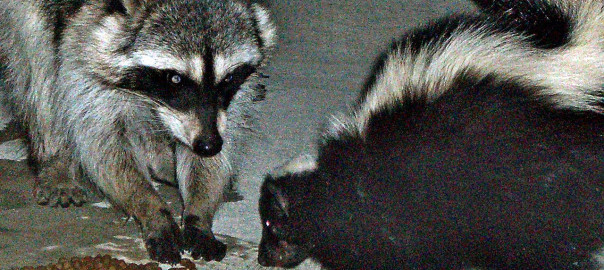Why are Raccoons Destroying My Lawn?

Raccoons live just about everywhere, from the East Coast all the way to California. These animals are nocturnal feeders that feed on your sweet corn, though they also feed on fruit trees, potatoes, peas and grubs. Wild raccoons cause many problems not only to people, but also to the environment as well. Even though they prefer areas with trees and a water source, more and more of them are raiding gardens since gardens are an easy source of food. Raccoons in a yard are capable of turning the entire landscape upside down. A family of raccoons will wreak havoc on your garden as they forage and strip plants of everything good for eating.
Most of their mischief is due in search of food, and the much sought-after delicacy is grubs. If a large number of grubs are present in your lawn, you may attract raccoons. These animals feed on the grubs and in doing so, they will dig to reach the grubs, damaging your lawn further. Really most grubs, which are in increasingly good supply are the European Chafer beetle. Raccoons are known for tearing up lawns completely in search for grub worms. Just one Raccoon is capable of destroying an entire yard in one night. Wild raccoons live in hollow logs, attics, under porches and have even been found living in farm machinery and in garages. Usually in winter, Animal Control gets lots of calls for Raccoons in people’s homes.
How to Identify Raccoons in your Garden
If your lawn has plenty of holes in it, or even your mulch pile has lots of holes, you probably have a nocturnal visitor. Raccoons will dig lawns and mulch piles up looking for insects to eat. Besides, they will empty bird feeders as well, and so keep an eye on these to see whether you have a raccoon problem. The proliferation and persistence of raccoons has inspired a couple of solutions; one of them is bound to work for you.
You can check and alter your watering schedule to watering in the morning from watering in the evening. This will allow the draining the soil before evening when raccoons are out foraging. Often, water less to avoid saturating the ground under the lawn. The smell of household ammonia, set out strategically in ‘Ammonia Stations’ is bound to discourage raccoons from digging your yard up. Ammonia stations can be made by soaking rags in ammonia and then placing them in metal containers for instance baking trays or old coffee cans, so the household ammonia won’t leak out into the ground.
Eradicating the grubs, and these critters will consequently stop digging. Controlling the population of raccoons could land you in detention and take it from me, the ground can be blown to smithereens and they will be clinging to a fragment of cosmic debris, digging it up for grubs like nothing ever happened. You will not win. If your green lawn is being dug up you’ll need a diagnosis. Check whether your lawn has infested with the delectable European Chafer.
To fix this problem you will need an effective natural parasite called beneficial nematodes (Heterorhabditis bacteriophora), that effectively gets rid of these grubs. When used correctly, nematodes are an organic form of pest control which can help reduce the number of grubs under your lawn. These microscopic organisms subsist in the garden soil and consume garden pests including the grubs that attract raccoons. Ask your local lawn centre associate for details of application or check out videos online explaining how nematodes are applied to your lawn.
But managing these masked diggers goes beyond that. Many people have given good feedback regarding the use of raccoon deterrents such as cayenne pepper, coyote urine (or ‘marking-your-territory’ yourself!) or even commercial repellents which are all somewhat effective. Used along side the ammonia stations, generous applications of commercial repellents can help you to make your lawn a place raccoon moms won’t desire to bring the ‘kids’. If your green lawn is small enough, you can unroll chicken-wire over the areas where the wild raccoons like to dig to frustrate them.
Just remember to move the chicken-wire every few days so it does not grow into the lawn. Also think about switching from a lush green lawn to more sustainable ecosystem which does not require as much water. Without the oversaturation that a green lawn requires, you will conserve water, foster co-existence and also save yourself from the aggravation of raccoons just being raccoons